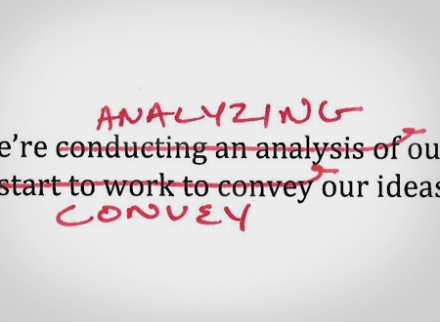Tighten your writin’
 Tighten Your Writin’ is an ongoing series dedicated to writing tips and best practices.
Tighten Your Writin’ is an ongoing series dedicated to writing tips and best practices.
In literature, it’s fine if a writer adds flowery language, ornate details, and other flourishes. That’s because when you sit down to read a book, you’re already interested in reading the text — or you wouldn’t have purchased it or picked it up off the shelf.
Marketing writing is different. Marketing and advertising copy needs to disrupt and engage; it needs to pull a reluctant reader in. And it needs to be efficient: You don’t have a lot of time to capture a reader’s attention.
That’s why Thinkso takes content — editorial concepts and written text — just as seriously as we take design. And although we believe everyone should strive to write well, good writing is critical to marketing-related communications.
How do we define “good writing”? We think it’s clean (error- and typo-free), clear, and engaging. It’s direct and grammatically sound. It’s integrated with a product’s visual components. It accomplishes (or conveys) identified business goals. If writing has all these qualities, we say it’s “tight.”
In the interest of helping our clients and friends tighten up their own writing, we’re starting a series devoted to simple, clear, easy-to-follow writing tips. Tightening up your own writing isn’t as hard as you might think.
The first step? Simplifying your verbs.
Tip 1: Simplify your verbs.
One of the most common (and distracting) style errors I’ve seen working professionals make is using clunky “filler” verbs — like “helping” or “conducting.” As an editor, I am constantly deleting these or rewriting sentences that have them.
Why? Because in my opinion, you’re either actively doing something, or you’re not. You’re usually not “helping improve” something — you’re improving it. You’re generally not “conducting a review” — you’re reviewing something or someone. You’re not “working to support an analysis” — you’re either supporting an analysis (because you’re helping your coworker) or you’re analyzing data yourself.
Sentences without filler verbs are also a lot more powerful: Saying you’re “improving” something sounds a lot more impressive than saying you’re “working to improve” something.
To that end, when you see words like “helping” and “conducting,” ask yourself if you can be more direct. You probably can.
Here are some common constructions that can be simplified:
- Conduct an analysis
- Working to provide (and all the “working to” constructions: working to consolidate, working to support, working to effectuate, etc.)
- Perform an assessment
- Carry out a review
- Make revisions
- Provide assistance
- Gain an understanding
- Helping develop
- Doing research
You Be the Editor
Now it’s your turn to be the editor. Take a look at the sample sentences below, and simplify the verbs as appropriate.
- I am working to conduct an analysis of the data before I hand it off to my colleague.
- He is going to perform an examination of the patient in the next two hours.
- I would love to provide assistance with the new initiative — especially if it means I get to conduct a survey of audience members.